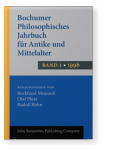The Epistemology of Humanism
Abstract
This essay explores the interconnections among the humanistic epistemological theories of Ficino, Pomponazzi and Cusanus apparent in the context of their reception of ancient Greek and medieval philosophy, especially Plato's Theaetetus and Aristotle's De anima. It shows that preceding the opposition between the (Neo-)Platonic scheme of knowledge favored by Ficino and the Aristotelian account of the intellect championed by Pomponazzi, Cusanus attempted to articulate the nature of the mind (mens) as such which all modes of knowledge presuppose. Central to this project is his work De coniecturis with its theory of the unity of the divine, reason, the understanding and the body, by means of which Cusanus undertook to show how all modes of knowledge are immanent in the mind even as knowledge itself is a process. Concluding critical remarks expound upon the principal significance for knowledge of the thought of nothing, which fundamentally defines the relation to self and other and therewith the horizon of the possible truth of knowledge.
